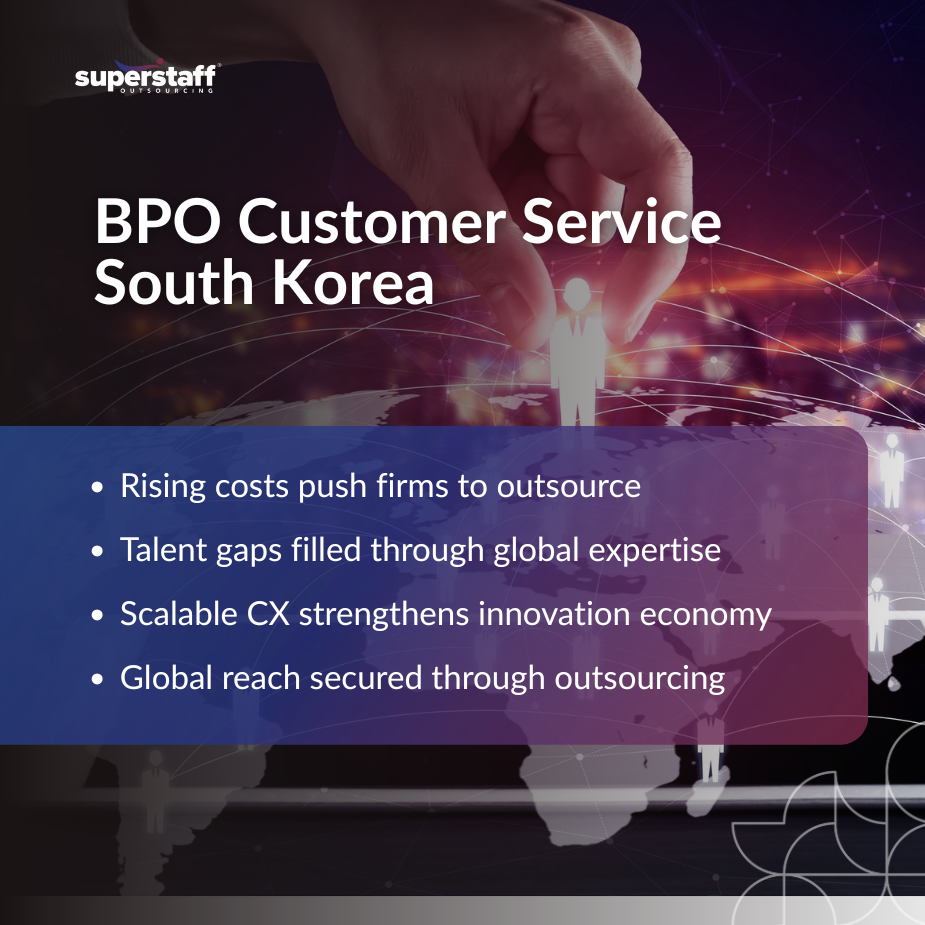
South Korea has long been celebrated as one of the most innovative economies in the world, recognized for its leadership in technology, manufacturing, and creative industries. From semiconductors powering global devices to biotech breakthroughs shaping the future of healthcare, Korea’s place in the global economy is secure.
Yet in 2025, the very engine of its growth is being tested by rising labor costs, demographic pressures, and intensifying global competition. To keep pace, companies are realizing that BPO customer service South Korea is no longer a secondary option but a vital strategy. Outsourcing has become the bridge that allows innovation-driven economies like South Korea to scale efficiently while sustaining global competitiveness.
South Korea’s Innovation Economy Faces Rising Pressures
South Korea’s economic identity rests on being a leader in innovation. The country spends heavily on research and development, consistently ranking among the highest globally in R&D intensity. Its breakthroughs in semiconductors, biotech, and artificial intelligence have defined its growth story. Yet as 2025 unfolds, the costs of sustaining this leadership have climbed sharply. The innovation economy demands significant reinvestment, but wages and operating expenses in South Korea have risen faster than many global competitors.
This reality is not unique to South Korea but is particularly pressing in a nation that relies heavily on export-driven industries. Global downturn risks make the high cost of innovation a heavier burden for local firms. Moreover, supply chain disruptions have forced Korean businesses to rethink how they allocate resources, especially when competitors in China, India, and Southeast Asia offer similar outputs at lower costs.
These dynamics highlight why many South Korean companies are exploring outsourcing as a strategic alternative to balance efficiency with innovation. The search for scalable solutions leads directly to the growing demand for BPO customer service South Korea, which gives companies the ability to focus their capital on long-term innovation while offloading functions that strain budgets.
Demographic Shifts and Workforce Gaps
Alongside rising costs, South Korea faces one of the most significant demographic challenges in the world. Its aging population is shrinking the labor pool, and birth rates remain among the lowest globally. This demographic reality is not simply a future concern; in 2025, it is already a constraint on growth. A smaller workforce means companies must compete harder for skilled professionals, particularly in fast-moving sectors like IT and biotech.
Adding to the strain is the brain drain of top talent, many of whom leave for Silicon Valley or other international hubs in search of better compensation and global exposure. Even those who stay often lean toward government or traditional jobs that offer more stability than riskier private sector roles. As a result, innovative firms are left with widening skill gaps.
Outsourcing becomes a strategic bridge here. By leveraging global talent pools, South Korean companies can access specialized expertise without being constrained by domestic demographic challenges. Outsourcing does not replace local innovation but complements it by filling operational and support gaps.
For example, BPO customer service South Korea allows businesses to scale customer-facing roles while reserving their local workforce for high-value research and product development. This integration of domestic and global talent ensures that innovation cycles are not stalled by workforce shortages.
Scalability Through Outsourcing

One of the most significant challenges for South Korean businesses in 2025 is sustaining scalability while remaining cost-efficient. Domestic markets alone cannot absorb the growing demand for support functions in technology, services, and manufacturing. This is where outsourcing plays a critical role.
By shifting functions such as IT development, R&D support, and back-office operations to trusted partners, companies can scale quickly without overextending their internal teams. Customer support in particular is a critical area. As Korean companies expand globally, their ability to deliver consistent and culturally attuned service becomes the foundation of customer loyalty. With BPO customer service South Korea, firms can ensure their customers across the world receive seamless, round-the-clock support.
Scalability through outsourcing also has a financial dimension. The cost savings realized from outsourcing can be redirected into the very R&D activities that fuel South Korea’s global reputation as an innovation hub. Hybrid teams that combine in-house innovators with outsourced operational specialists create a more agile, cost-balanced organization. Outsourcing does not dilute innovation but enhances it by ensuring resources are applied where they matter most.
Global Reach Through Outsourcing
South Korea’s innovation economy cannot thrive in isolation. Its success has always depended on global markets, and in 2025, this dependence is even more pronounced. To compete effectively in markets across the United States, Europe, and Southeast Asia, South Korean companies must deliver localized experiences that resonate with diverse customers.
Outsourcing strengthens this global reach. Partners with multilingual and culturally attuned teams enable Korean businesses to connect authentically with international customers. For instance, BPO customer service South Korea is no longer about handling local inquiries alone but about creating customer experiences that match the expectations of global clients. Offshore and nearshore partnerships also make 24/7 operations possible, something increasingly demanded by international markets.
This global scalability is not only about meeting customer expectations but also about securing South Korea’s position against regional competitors. Companies from China and India are rapidly expanding their global outsourcing models, and Southeast Asia is positioning itself as a cost-efficient alternative. For South Korea to maintain its leadership, outsourcing provides the necessary tools to deliver innovation and service at a global standard.
Outsourcing Trends Shaping South Korea’s 2025 Strategy
The role of outsourcing in South Korea is not emerging in isolation. It is part of broader shifts that have been unfolding in the global economy. Analysts and business leaders alike point to outsourcing trends in South Korea that show a steady increase in the adoption of global partners for IT, back-office, and customer support services. These trends reflect not only cost pressures but also a recognition that no single economy, no matter how innovative, can manage every function internally at the same level of efficiency.
Additionally, global investors have taken notice of how outsourcing complements South Korea’s strengths. By focusing domestic talent on high-value innovation and offloading repetitive or customer-facing roles, the nation can balance growth with sustainability. These outsourcing trends in South Korea point to an economy that is learning to adapt quickly, a hallmark of innovation itself.
The Rise of South Korea Outsourcing as a Strategic Lever
In 2025, it is evident that South Korea outsourcing is not a temporary measure but a long-term strategic lever. Companies are increasingly embedding outsourcing into their business models, not simply as a cost-saving mechanism but as a way to sustain growth across industries. Whether in manufacturing, technology, or services, outsourcing has become a core part of South Korea’s ability to remain globally competitive.
This shift is particularly visible in the customer service space, where BPO customer service South Korea has taken on new importance. Firms recognize that while their products may be innovative, customer experiences shape brand loyalty across international markets. Outsourcing ensures that these experiences are consistent and high-quality, even as Korean firms continue to invest in new technologies and solutions.
SuperStaff’s Role in Supporting South Korea’s Innovation Economy
For outsourcing to truly deliver on its promise, Korean businesses need partners who understand the unique demands of an innovation-driven economy. This is where SuperStaff comes in. With established hubs in the Philippines and Colombia, SuperStaff provides scalable and multilingual support designed to align with global expansion goals.
Our teams are equipped to handle the complexities of BPO customer service South Korea, along with back-office, IT, and finance outsourcing that supports growth across industries. By partnering with SuperStaff, South Korean companies gain more than just operational support. They gain a trusted partner that understands the urgency of balancing innovation with cost-efficiency. Our expertise in supporting knowledge-intensive industries positions us to align seamlessly with Korea’s push for global leadership.
SuperStaff’s offshore and nearshore capabilities allow South Korean firms to scale without limits, access diverse markets, and maintain the agility needed to compete on a global stage. This partnership model ensures that innovation remains at the heart of South Korea’s economy while outsourcing provides the steady foundation for sustainable growth.
The Future of Outsourcing Services in South Korea 2025
Looking ahead, it is clear that outsourcing services in South Korea 2025 will continue to expand in scope and significance. The pressures of cost, demographics, and competition are not short-term trends. They are structural realities that demand long-term solutions. Outsourcing will increasingly be viewed not as a supplemental option but as a standard business practice integrated into the innovation ecosystem.
For companies determined to remain leaders in global industries, outsourcing offers the flexibility, scalability, and resilience that modern markets demand. It allows South Korean businesses to remain lean and agile while continuing to invest heavily in the innovation that defines their global reputation.
BPO Customer Service South Korea as the Key to Competitiveness
South Korea’s ability to maintain its leadership as an innovation-driven economy depends on its willingness to embrace outsourcing as a core strategy. Rising costs, demographic decline, and global competition create challenges that cannot be overcome by internal resources alone. Outsourcing provides scalability, customer experience excellence, and global reach, ensuring that innovation is not sacrificed to operational pressures.
BPO customer service South Korea is especially vital because it ensures that innovation on the product side is matched by excellence on the customer experience side. Without this balance, even the most advanced technologies risk falling short in international markets. Decision-makers recognize that by investing in outsourcing, they protect their global competitiveness while ensuring resources remain available for long-term growth.
For decision-makers and investors looking to secure sustainable growth in 2025 and beyond, the time to act is now. SuperStaff stands ready to support South Korean companies with world-class outsourcing solutions that enable innovation while reducing costs. From BPO customer service South Korea to IT, back-office, and finance support, our services are designed to help businesses remain competitive in a fast-changing global economy. Partner with SuperStaff and ensure your place in the future of South Korea’s innovation economy.






